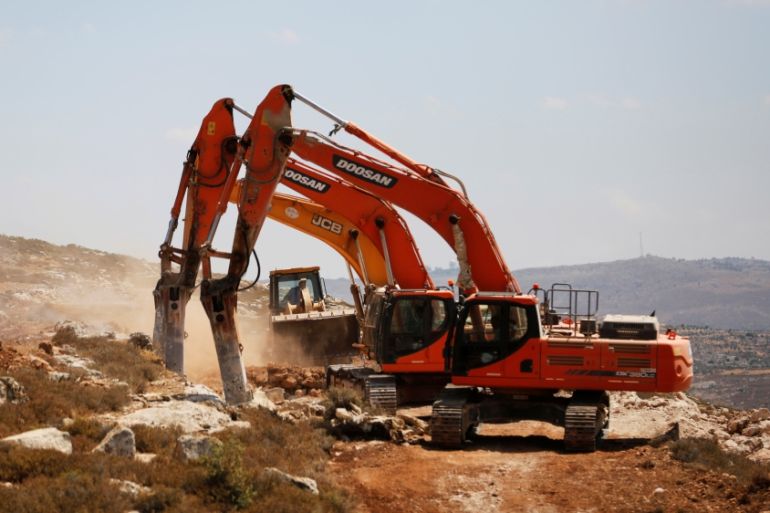Palestinian landowners push to halt settlement building
Palestinian landowners are following up with their efforts to stop the construction of the Amichai settlement.

With his face pale, his cheeks hollow and his eyes weary, Fawzi Ibrahim sat on a sofa, waiting for his ride to the doctor’s office.
The 62-year-old held his head in his hands as though it were too heavy for his neck to carry.
The agony he felt wasn’t merely physical, he explained.
“I got used to sorrow,” Ibrahim said. “I used to walk a 15km stretch from north to south on my land … [but] not any more.”
The Ibrahims owned around 800 hectares of land in the Palestinian village of Jalud, south of Nablus.
They have been planting barley, chickpeas and sesame on it for generations. But over the last couple of decades, more than 90 percent of their land has been taken over by Israel.
Now, they struggle to access the little land that remains because of the illegal Israeli settlements and outposts that dot the area.
READ MORE: West Bank – ‘One day on my land is worth a lifetime’
Strangled by settlements
The Ibrahims aren’t the only ones who have been affected. Close to 1,600 hectares of land in Jalud is off limits to its Palestinian owners – either as a result of official Israeli confiscation orders or because Israeli settlers have intimidated, harassed and attacked Palestinian farmers and taken over locals’ land to plant vineyards and olive groves of their own.
Israel’s solution to the settler violence has been to ban Palestinian farmers from accessing their land without prior coordination, enabling them to plough, plant, reap and harvest under military escort only a few days a year.
“An officer once told me he’d allow me a ‘whole week’ to harvest my olive trees, I told him ‘I’ll give you a week to count my trees’,” Ibrahim recalled. “We used to work in the land for two months with tens of workers.”
Jalud is strangled by a ring of eight illegal settlements and outposts, soon to be nine.
In June, Amichai was approved as the first official Israeli government-approved settlement in over two decades. It is reportedly intended to house 40 settler families evacuated from the outpost of Amona last February, in 100 housing units.
|
|
On September 3, the Israeli government also approved a budget of nearly $17 million for the construction of the settlement. Work resumed there on Monday.
“The idea behind this location of settlements and outposts is to rule and divide the Palestinian population,” said Dror Etkes of Kerem Navot, an Israeli NGO monitoring settlement activity.
“We have to remember that 50 years after the Israeli settlement enterprise started, still over 85 percent of the population in the West Bank is Palestinian,” Etkes continued.
“The challenge that the Israeli settlement architecture will have to deal with is how to compensate for the demographic supremacy of the Palestinians. The answer is very simple: it’s by creating an artificial, violent, geographical supremacy for the small Jewish Israeli minority who lives in the West Bank.”
Going to the International Criminal Court
Two weeks ago, Palestinian landowners, three village heads and the Israeli rights organisations Bimkom and Haqel filed an objection to the Israeli Civil Administration, a military governing body in the West Bank, in a bid to prevent the approval of the Amichai building plan.
They said that the new settlement would harm Palestinians, prevent them accessing their land, limit future expansion of the three nearby villages, and greenlight further land theft by settlers.
In the objection discussed on Thursday, Palestinians also questioned the Israeli plan to build a new settlement less than 1.5 kilometres away from the illegal settlement of Shilo.
READ MORE: Palestinians brace for new West Bank settlement
The Palestinian leadership is also gearing up to take the settlement issue to the International Criminal Court (ICC).
“The decision is taken, the documentation is ready and the evidence is ready and the letter is signed by the president, we believe it’s a matter of timing now,” Hanan Ashrawi, a member of the Palestine Liberation Organization’s (PLO) executive committee, told Al Jazeera.
“We pay the price if we try to hold Israel accountable and in the meantime, Israel acts with full impunity to continue its land theft and destruction of the Palestinian state.”
‘We’re still picking the olives’
But Fawzi Ibrahim was not the kind of person to give up without a fight.
Qamar Mashriki-Assad of Haqel recently filed her fourth petition to the Israeli Supreme Court on his behalf.
In this petition concerning Amichai, she argues that part of the settlement will be built on land that Ibrahim privately owned and had been cultivating. The civil administration, the petition points out, confiscated more of Ibrahim’s land without officially informing him.
Back in Jalud, Mahmoud Ibrahim, Fawzi’s son, can see the bulldozers digging into his family’s land from the rooftop of their home. The new settlement did not only take over his land, but will leave the Palestinians who live here further isolated.
Despite this grim reality, Mahmoud seeks comfort in the past and his father’s words: “The Turkish army sat under the olive trees during the first world war, the Brits followed, then the Jordanians and the Israelis … They all left and we’re still picking the olives, just like our grandparents did and our grandchildren will do.”
Fawzi Ibrahim died of heart complications shortly after he was interviewed for this story.